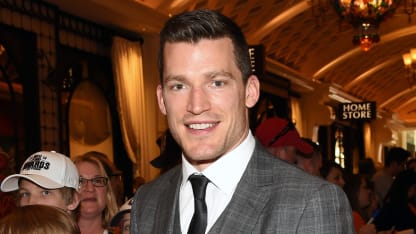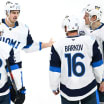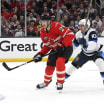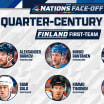Ference set to 'hit ground running' in new NHL job
Former defenseman named League's director of social impact, growth, fan development

© Ethan Miller/Getty Images
That meal between Ference, then a defenseman for the Calgary Flames, and Suzuki would turn into several meetings in 2006 with the Suzuki Foundation that would feed Ference's passion for environmentalism cultivated while doing chores at his parents' house.
Ference became a voice for conservation during an NHL career that included a Stanley Cup with the Boston Bruins in 2011 and time as captain of the Edmonton Oilers from 2013-15. He parlayed that into his new role as NHL director of social impact, growth and fan development, which he started Monday.
The position is a continuation of the relationships Ference built with the NHL and League executives playing 907 games over 16 seasons with the Pittsburgh Penguins, Flames, Bruins and Oilers.
"I feel like I can hit the ground running and have some pre-existing relationships and ideas," Ference said. "If I had to draw a perfect scenario for what I can maybe be involved in after my playing days, this is pretty much it."
Ference's first high-profile project was the NHL Players' Association Carbon Neutral Challenge in 2007, when he helped players purchase clear-air credits to compensate for the extra carbon produced by their extensive travel (carbon offsets). The challenge helped the League become a leader in environmental conservation by switching to LED lights, adding solar panels in arenas, and starting freshwater conservation initiatives.
That success led to Ference starting conversations with the NHL and being introduced to those who shared a similar passion. Three years later, NHL Green was launched to promote green business practices across the League and to preserve the environment.
"Instead of just recycling at home, and changing your lightbulbs and being more efficient … good for you, but why not talk about it?" Ference said. "Why not push yourself to be a champion for it? Those good ideas and initiatives can bloom into bigger things. That's what I believed really kick-started the NHL into thinking about some of these issues."
Ference will be responsible for helping advance the League's social impact, community based grassroots and fan development growth efforts while attracting new audiences though efforts anchored by the Declaration of Principles.
"It's going to go a lot of different ways over the next few years, but at the base of it will be how do we get more people involved with hockey," Ference said. "How do we actively promote the great culture this game is? My goal is not to make people love hockey just by entertaining them. I'd like to try to introduce people to hockey and the culture of hockey, the things that I have experienced, by picking up a stick and creating those memories with friends and falling in love with the game."
"The DOP will be a guiding light. My goal is to take those words and create action out of them."
Action has been the operative word for Ference. In 2014, he received the King Clancy Memorial Trophy for his leadership qualities on and off the ice, and humanitarian contributions in his community.
"If you're going to do something, do it right," Ference said. "Don't do it halfway. Don't do it where it's just good enough. If you're going to put the time and effort into something, do an awesome job at it.
"We're not only trying to create new things, there's a lot of great, old programs that's been around the League for a long time. Sometimes it's just retooling it and looking what our audience is now and what it could be, and how we can take some of those initiatives and make them better, make them more impactful, make them reach a broader audience."
Ference retired from the NHL on July 13, 2017 after a hip injury limited him to six games with Edmonton in 2015-16.
"I don't feel like I missed out," Ference said. "Looking back, it quite literally wouldn't have been in my wildest dreams to think I could have ever had that as a career. Coming out of it, it's been a positive experience. I think it's because of those outside interests, and because of being involved in things other than just playing the game, have really helped me transition into a career that's incredible.
"This is something now that I can be involved in and have another passion for. I can now come in and wake up and have great purpose again."

















